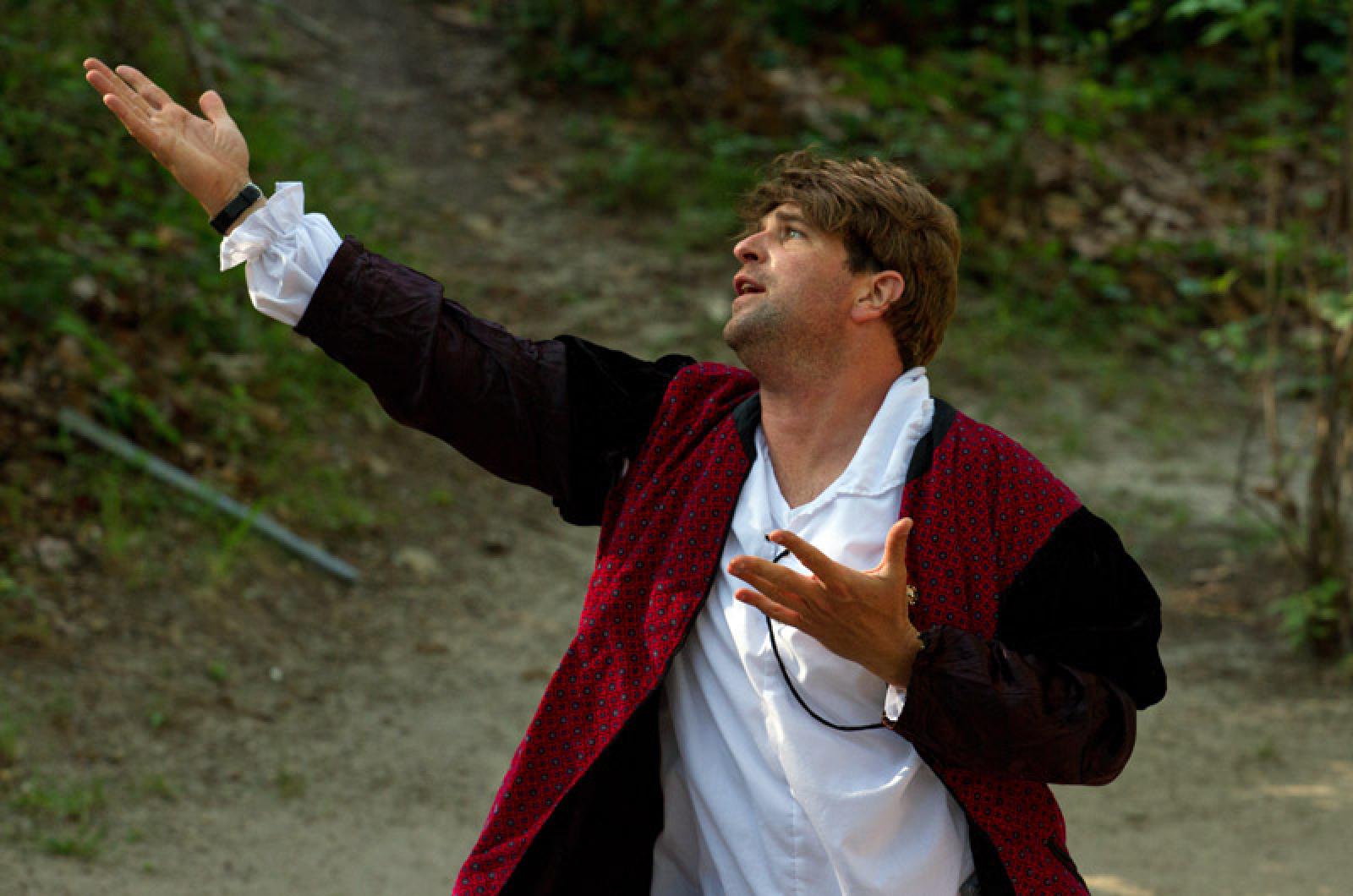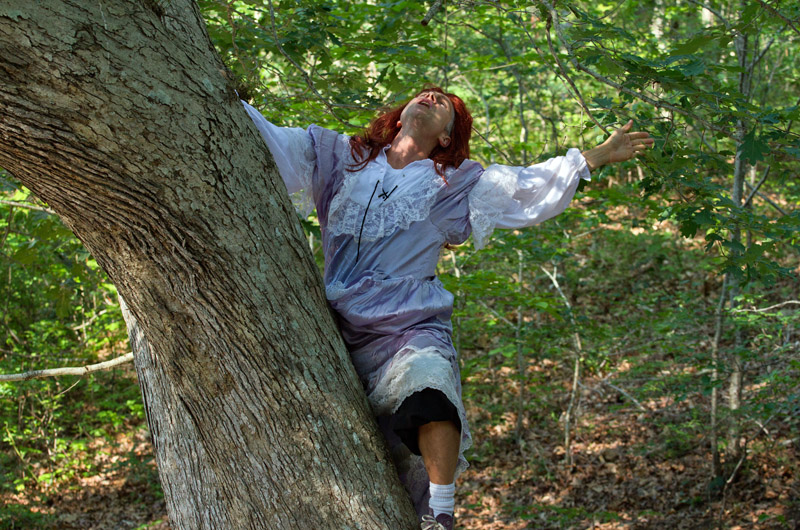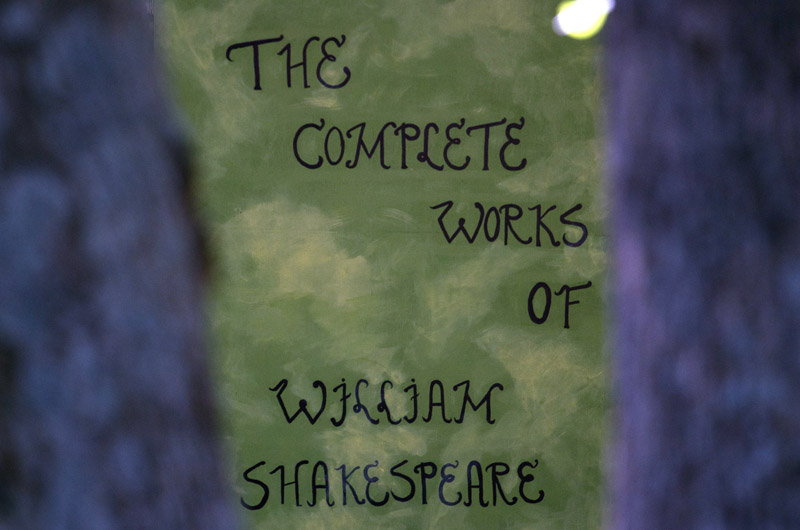Even the most esoteric adaptations of Shakespeare’s plays typically don’t include a rapping Othello or a hyper-speed Hamlet. But performing the entire Shakespearean canon in two hours requires a little more creativity than the average production. And with only three actors performing dozens of iconic roles the potential for humor is large.
The Vineyard Playhouse will present The Complete Works of William Shakespeare (Abridged) [Revised] every Wednesday, Thursday, Friday and Saturday under the evening sky beginning at 5 p.m. each night at the outdoor amphitheater by the Tashmoo overlook. The show continues through August 15.
The play was originally written by Adam Long, Daniel Singer and Jess Winfield in the 1980s and each performance puts its own spin on the production. The show was previously performed by the playhouse during the 2001 and 2002 seasons, and it makes its return with director Matt Andrews and actors Scott Barrow, Christopher Kann and Chelsea McCarthy. This cast list is especially notable given the inclusion of a female cast member, as the play is traditionally performed with three males. That does not mean that any of gender swapping gags are going away though.
“All that humor is still there, especially cross dressing,” explained Mr. Barrow. “We’ve just created a convention in which our one female cast member doesn’t play any of the female parts.”
One of the benefits of the show comes from its repeat viewing power, given that each show requires audience participation, and changes based on the venue and setting, so much so that even just sitting down in a different spot can change the audience member’s whole experience.
“You’re seeing a completely different show if you’re seeing it today,” said Mr. Andrews. “Even if you’ve seen it before, it always changes.
That includes changes to the script such as adding references to the Red Sox lineup and Deflategate, as well as removing some outdated lines that poke fun at the television show General Hospital or Newt Gingrich. And doing the production outdoors also means that some small adjustments must be made.
“There are all these jokes where we say, ‘Can you bring up the house lights?’ and we’re obviously doing it in natural light outside,” said Mr. Barrow. “So we have to do something with that humor to make it work.”
The jokes throughout the show are designed to be multi-varied, however, and appeal not only to a vast range of ages, but also a range of different Shakespeare fans.
“You don’t need to have seen a lick of Shakespeare in your life,” said Mr. Andrews. “But if you have, there are some jokes that only a few people may get.”
The style of humor is also reminiscent of the Bard’s work, appealing to a multitude of comedic tastes.
“It does mirror Shakespeare in that you’ve got very high brow humor and very low brow humor, just like in a Shakespearean play,” said Mr. Barrow. “You’ve got the slapstick, but then you’ve got very high brow wit almost like Oscar Wilde.”
All three of the actors for this run have grown up on the Island working with the Fabulists, the Saturday morning summer theatre for kids, in which short rehearsal times and rapid improvisation are mainstay skills. That experience has come in handy.
“The amount of material in this show is colossal. You could do five weeks of rehearsal and still be champing at the bit,” said Mr. Barrow. “We did two and a half weeks.”
The small cast is stretched even further by the number of roles they have to take on throughout the performance. Mr. Barrow’s script bleeds with yellow, green and purple highlighter marks as part of a system he developed to mark where he had to go in and out of character, sometimes switching three times in a matter of several lines.
“These actors are all over the stage, and it’s a very physical show,” said Mr. Andrews. “So even just the movement is intense.”
All and all, the three actors take on around 13 distinct characters, a tall order for any show, but especially given the classic nature of many of the roles. Towards the end, these efforts of switching character become more intense, and Mr. Barrow’s notations on his script begin to take on the appearance of artwork. This is nothing, however, compared to actually having to act it out.
“We have three highly skilled actors that are alumni,” said Mr. Andrews. “And they can really pull it off, but they really have to.”
“You’re out in the amphitheater and you’re there with your pizza, you’re there with your wine, enjoying it,” added Mr. Barrow. “And it’s really a something for everyone kind of show.”









Comments
Comment policy »